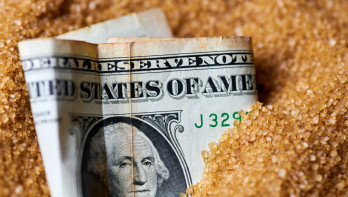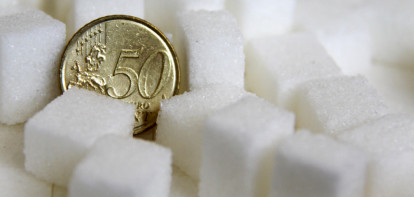Analysis Sugar
Mixed outlook for European sugar market
The beet cultivation in Europe is starting this season with a considerable delay on average. The wet conditions are affecting not only growers in the Netherlands. Sugar remains under pressure on the European sugar market, although there is no significant drop. The sugar import in Ukraine has already reached its quota for this season and is formally stopped.
Following last year, this growing season is far from ideal for beet cultivation in Europe. The heavy rainfall in Western Europe has caused significant delays in sowing and water damage is also common. According to Cosun Beet Company, a few percent still had to be sown in the southeast at the beginning of June. Sowing in neighboring countries was also a significant challenge. Sugar producer Nordzucker reports that sowing was very late in the Scandinavian countries and reasonable progress was only made in Sweden and Denmark in May. Beet growers in Poland and Eastern Europe seem to have had better luck with the weather, as sowing could generally be done on time.
Clear estimates of the sugar beet area for 2024/25 in Europe are not available (yet) apart from some expectations from sugar producers and the European Commission (EC), with the latter seeing a 2% increase in area due to improved sugar market prices. This is expected to result in an area of 1.495 million hectares. However, this limited increase seems to have been quickly drowned out by the weather in recent weeks and the damage it has caused, apart from other factors in Europe such as the yellowing virus that is affecting tonnages in France. This is also confirmed by the May edition of the JRC-MARS Bulletin, which states that in addition to water damage, insect pest pressure in various parts of Europe is causing damage.
European sugar prices under pressure
The conditions in European fields have little effect on global sugar prices due to the limited import and export volumes of sugar from Europe, and European sugar remains significantly more expensive than world market prices. Additionally, there could be many changes in the coming months with beet cultivation. According to European Commission data, European sugar prices are declining, albeit slowly. The average selling price for sugar was €831 per ton of white sugar in April 2024, compared to €853 per ton earlier this year in January. The price differences between the regions into which Europe is divided by the EC are narrowing. The average price based on short-term contracts is around €737 per ton and has significantly dropped compared to nearly €1,000 per ton paid at the beginning of 2023.
A key factor contributing to the declining European sugar prices is the improved sugar production in 2023/24 compared to the previous season, although the total European production is not entirely satisfactory due to the wet autumn and lower sugar content than usual. Another factor influencing European sugar prices is Ukrainian sugar entering Europe at more competitive prices. According to data from TAXUD, the Directorate-General for Taxation and Customs Union of the European Commission, the average import price for sugar from Ukraine was €641 per ton at the borders in May 2024, a price that is hard to compete with. With export volumes of more than 60,000 tons of sugar per month, the export has increased significantly in recent times, but has since decreased considerably. For example, sugar exports were around 20,000 tons in May. In total, according to the EC, there are 394,000 tons for this season (September/October) 2023/2024.
The current expectation is that Ukrainian sugar imports will only resume in the new calendar year 2025. Taras Vysotskiy, the Ukrainian Minister of Agriculture, recently announced that the government will formally suspend sugar exports to the European Union for the rest of this year as its quota has been reached. This stems from the plan to suspend import duties on Ukrainian agricultural exports in April, which imposed restrictions on the volumes of various sensitive products, including sugar, that can enter Europe annually before an 'emergency brake' is activated. From 2025, this quantity will then be limited to a maximum of 109,438 tons under the 'emergency brake' and will run until June 4, 2025. With these smaller volumes, the impact of Ukrainian sugar on the European sugar market is expected to further decrease.
Sugar futures markets under pressure
Sugar futures prices continue to remain under pressure on the markets, as in previous weeks. The white sugar contract in London opened on Tuesday morning, June 11, at $545 per ton. The main reason remains the Brazilian sugarcane harvest, which, according to various Brazilian institutions such as the well-known DATAGRO, is in better shape than previously expected. This is expected to lead to higher sugar production. Additionally, sugar production in the country has started well and the sugar exports from the country are above average. Moreover, the Brazilian currency Real has depreciated further in value over the past months. Today, 1 Brazilian Real is equal to $0.19, while in January it was $0.21. The relatively weak Brazilian Real is not a good development for the overall economy of the country and affects Brazilian sugar trade. It could lead Brazilian producers to try to sell their sugar in bulk abroad, according to analysts.
In India, the monsoon rains have started, which has a positive impact on sugarcane growth in the country, the second largest sugar producer in the world. Overall, Asian countries are in a better position in terms of sugarcane cultivation compared to last season, as stated by various sugar analysts.
But not all market news is putting pressure on prices. India's export ban may be extended indefinitely. A report from the International Sugar Organization ISO earlier this week may push prices up. In February, the ISO estimated the global sugar deficit for 2023/24 at 0.69 million tons. Yesterday, this was significantly revised upwards to a deficit of 2.95 million tons. The production forecast was revised down by 0.48 million tons to 179.27 million tons. On the other hand, the consumption forecast is estimated to be 1.79 million tons higher at 182.22 million tons.




